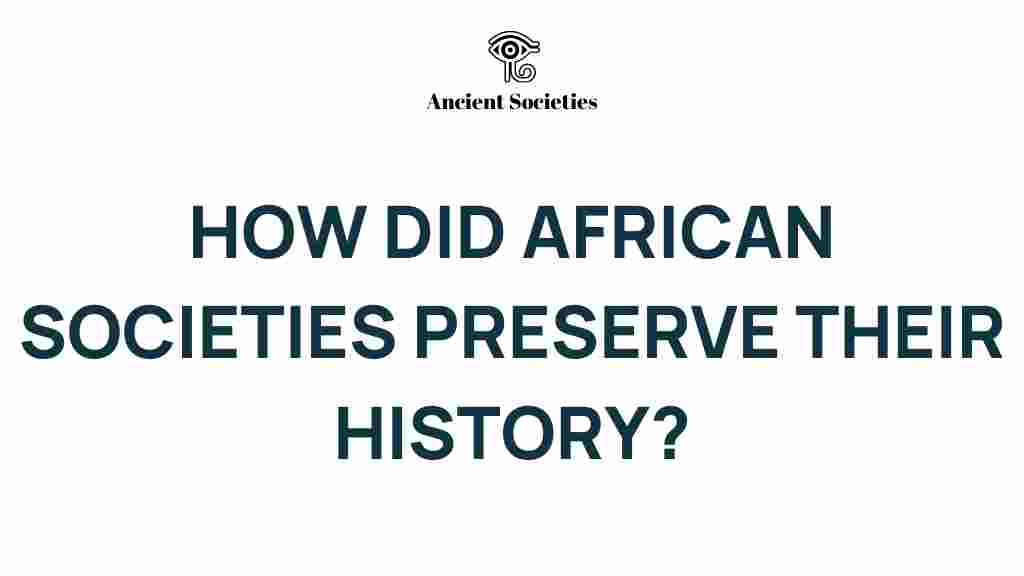Unveiling the Secrets: How African Societies Preserved Their History
African history is rich and diverse, comprising various cultures, traditions, and ancient civilizations that have significantly contributed to the world’s heritage. One of the most remarkable aspects of African history is how these societies have preserved their past through oral tradition, storytelling, and various preservation methods. This article explores the fascinating ways in which African communities have maintained their cultural heritage and historical records, ensuring the survival of indigenous knowledge through generations.
The Importance of Oral Tradition in African History
Oral tradition stands at the core of African history, acting as a vital medium through which stories, customs, and values are passed down. Unlike written records, oral traditions rely on the spoken word, making them dynamic and adaptable. Here are some key aspects of oral tradition:
- Storytelling: Elders and storytellers play a crucial role in recounting tales that encapsulate the beliefs and experiences of their communities.
- Preservation of Culture: Oral traditions preserve not only history but also cultural practices, rituals, and languages unique to various ethnic groups.
- Community Engagement: Storytelling often involves the participation of the community, fostering a sense of belonging and shared identity.
How African Societies Use Storytelling to Preserve Their History
Storytelling is an art form in many African cultures, serving as a means to convey history and impart moral lessons. Here’s how storytelling contributes to the preservation of African history:
- Myths and Legends: Many African myths explain the origins of people, their cultures, and natural phenomena. These stories often contain historical truths intertwined with cultural morals.
- Historical Narratives: Storytellers recount significant events, battles, and the lives of historical figures, preserving the legacies of those who shaped their communities.
- Entertainment and Education: Storytelling sessions are often entertaining, captivating audiences while educating them about their history and values.
Preservation Methods in African Societies
African societies have employed various preservation methods to ensure the survival of their history and cultural heritage. These methods often reflect the community’s values and social structures:
- Rituals and Ceremonies: Many African cultures incorporate history into rituals, where participants reenact historical events or honor ancestors, thereby keeping the past alive.
- Art and Music: Traditional art forms and music often convey historical narratives and cultural significance, serving as a visual and auditory record of the past.
- Community Gatherings: Events such as festivals and community meetings provide platforms for sharing stories and histories, reinforcing communal ties and collective memory.
Challenges in Preserving African History
Despite the rich methods of preservation, several challenges hinder the effective safeguarding of African history:
- Colonial Impact: Colonization disrupted many traditional practices and led to the loss of languages and cultural identities.
- Modernization: As societies modernize, oral traditions may be overshadowed by written forms of communication, risking the loss of indigenous knowledge.
- Climate Change: Environmental changes threaten the physical spaces where oral traditions are performed, such as sacred sites and community gathering places.
Community Practices in Preserving History
Community practices play a vital role in the preservation of African history. These practices often involve collective efforts and shared responsibilities:
- Intergenerational Transmission: Elders pass down stories and knowledge to younger generations, ensuring continuity and respect for the past.
- Documentation Initiatives: Some communities are taking steps to document oral histories through audio recordings and written accounts, bridging traditional and modern preservation methods.
- Collaboration with Scholars: Collaborations between local communities and historians or anthropologists can help document and preserve oral traditions while respecting indigenous rights.
Steps to Enhance the Preservation of African History
To further enhance the preservation of African history, communities can take several proactive steps:
- Revitalize Language: Encouraging the use of indigenous languages in storytelling and education can help maintain cultural identity and historical knowledge.
- Support Local Art Forms: Promoting traditional art, music, and dance can foster appreciation for cultural heritage and its historical significance.
- Utilize Technology: Leveraging technology, such as social media and digital archives, can help share and preserve oral traditions globally.
Troubleshooting Tips for Preserving Oral Traditions
Preserving oral traditions can come with challenges. Here are some troubleshooting tips for communities facing difficulties:
- Encourage Participation: Ensure that storytelling sessions are inclusive, encouraging participation from all age groups to foster a sense of community ownership.
- Organize Workshops: Conduct workshops on storytelling techniques to empower individuals to share their histories effectively.
- Document Stories: Encourage members to record stories, whether through audio, video, or writing, to create a repository of oral histories.
The Role of External Organizations
External organizations can play a significant role in supporting the preservation of African history. Collaborative efforts can lead to impactful preservation initiatives:
- Grants and Funding: Organizations can provide grants to support community projects aimed at documenting oral traditions.
- Awareness Campaigns: Raising awareness about the importance of oral traditions can garner support from broader audiences.
- Training Programs: Offering training on preservation techniques can empower communities to take ownership of their histories.
Conclusion: The Everlasting Legacy of African History
Preserving African history through oral tradition, storytelling, and cultural practices is essential for maintaining the richness of the continent’s diverse heritage. As communities implement preservation methods and face challenges, it is vital to recognize the importance of indigenous knowledge and the role of community practices in safeguarding history. By fostering an environment that values oral traditions and engages all generations, African societies can ensure that their historical narratives continue to thrive.
For further reading on the importance of oral traditions, visit this external resource. Additionally, learn more about local initiatives aimed at preserving African cultural heritage by checking out this internal link.
This article is in the category History and created by AncientSocieties Team
